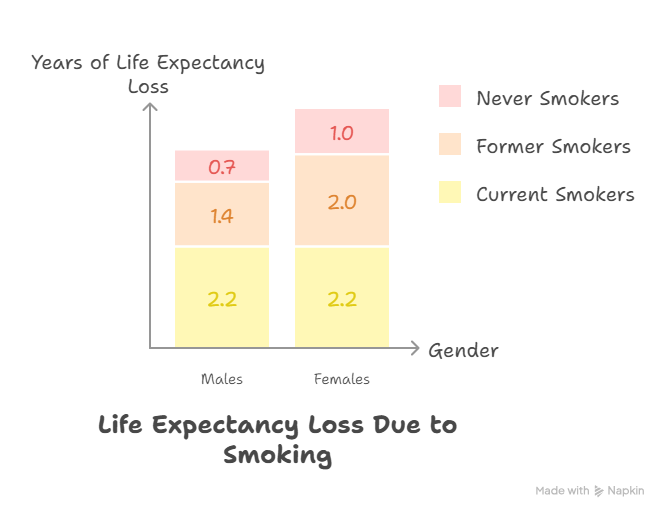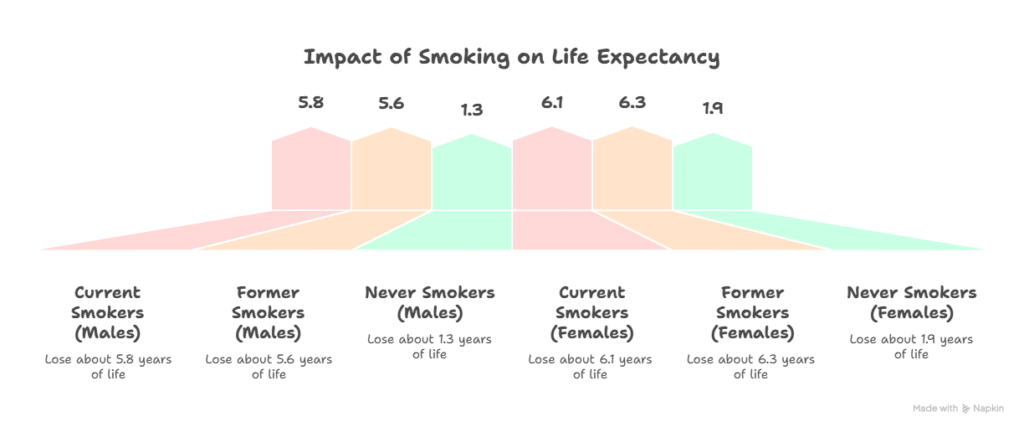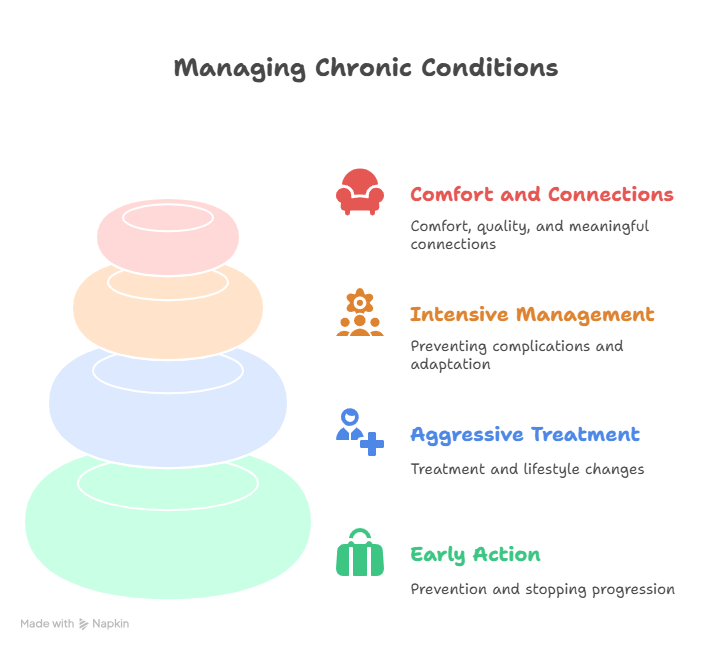COPD Life Expectancy by Stage is one of the most common questions people have after diagnosis. If you are reading this blog, it means you are suffering from COPD, and secondly, you are serious about your treatment. Your COPD stage doesn’t define everything about your future. Your COPD stage doesn’t define your future; each stage just brings different challenges. Understanding what to expect can help you make the best decisions for your health and happiness.
“How many more days will I live?” Maybe these are some of the first questions that come to your mind when your doctor tells you that you have COPD. It is natural to think about this. COPD affects everyone differently, and your stage is just one piece of the puzzle. Let’s look at what research tells us about life expectancy at each stage, while remembering that these are averages—many people live much longer than expected.
Table of Contents
COPD Life Expectancy by Stage lets Understanding COPD Stages:
COPD is divided into four stages based on the health of your lungs.How Doctors Estimate COPD Life Expectancy by Stage they do a simple breathing test called spirometry tests, which checks how much air you can force out of your lungs in one second (called FEV1). pmc.ncbi.nlm.nih
The four stages are:
· Stage 1 (Mild): 80% or higher lung function
· Stage 2 (Moderate): 50-79% lung function
· Stage 3 (Severe): 30-49% lung function
· Stage 4 (Very Severe): Less than 30% lung function
There isn’t much noticeable difference between stage 1 and stage 2, and patients usually don’t face major problems at these stages. But from stage 3 onward, the difficulties start increasing, and by stage 4, everything becomes very challenging.
Stage 1 COPD: The Hopeful Beginning
Life Expectancy Impact: Minimal to None
The Good News: People with Stage 1 COPD often have a normal life expectancy.
What the Research Shows:
· Current smokers: May lose only 0.3 years of life expectancy
· Former smokers and never-smokers: Often have normal life expectancy
· Overall outlook: Their life is exactly like other healthy people’s.
What Stage 1 Feels Like:
· Symptoms: Mild shortness of breath during exercise or hard work and occasional cough
· Daily Life: You can do almost everything normally.
· The Challenge: 90% of people don’t even realize they have COPD.
Key Actions for Stage 1: This is your golden opportunity. Actions you take now can prevent progression to later stages:
👉 Quit smoking immediately -this is the most important step.
👉 Start exercising regularly -helps maintain lung function.
👉 Get vaccinated against flu and pneumonia.
👉 Try yoga.
Remember: Stage 1 is often called the “prevention stage” because if you take good care of yourself at this stage and follow the steps mentioned above, you can delay the progression for many years. And by ‘many years,’ I don’t mean just 2–3 years—it can be as long as 15–20 years.
Stage 2 COPD: The Wake-Up Call
Life Expectancy Impact: Moderate Reduction
What to Expect: People with Stage 2 COPD typically lose 1-2 years of life expectancy compared to those without COPD. sciencedirect
What the Research Shows:
For 65-year-old males:

What Stage 2 Feels Like:
· Symptoms: Cough with phlegm, difficulty breathing during daily activities
· Daily Life: You start facing difficulty with physical activities.
· The Reality: Most people seek medical help by this stage, but some still dismiss it as just a cough or rely on medicines from a local pharmacy. This often leads to serious problems later on.
Key Actions for Stage 2: Aggressive management becomes crucial:
👉 Medication compliance is essential—use inhalers exactly as prescribed.
👉 Pulmonary rehabilitation programs show excellent results in a study
👉 Stay active within your limits—exercise helps slow progression.
👉 Monitor symptoms closely and report changes to your doctor/study
Hope Factor: Many people with Stage 2 COPD live healthy, fulfilling lives for many years with proper management.
Stage 3 COPD: The Serious Turn
Life Expectancy Impact: Significant Reduction
What to Expect: Stage 3 COPD typically reduces life expectancy by 6-9 years compared to people without COPD. sciencedirect
What the Research Shows:
For 65-year-old males:

What Stage 3 Feels Like:
· Symptoms: Frequent shortness of breath, even during light activities or at rest
· Daily Life: Serious trouble doing everyday tasks.
· Complications: More frequent lung infections, possibility of oxygen therapy in many cases.
· Quality of Life: Noticeable impact on everyday life.
Key Actions for Stage 3: Intensive management becomes critical:
👉 Oxygen therapy may be needed and significantly improves survival.
👉 Prevent infections strictly; they can be life-threatening.
👉 Manage other health conditions aggressively (heart disease, diabetes)
👉 Consider advanced treatments like the Pulmonary rehabilitation study.
Stage 4 COPD: The Final Challenge
Life Expectancy Impact: Substantial Reduction
What to Expect: If a person has stage 4 COPD, his or her expected lifespan is 8–9 years shorter than that of a normal person. Most people live for 2 to 5 years after diagnosis. pmc.ncbi.nlm.nih+2
What the Research Shows:
· Average life expectancy: 2.5 years according to recent studies
· Individual variation: Some people live much longer than average.
What Stage 4 Feels Like:
👉 Symptoms: 1. Severe breathing difficulty.
2. constant fatigue.
3. frequent flare-ups.
👉 Daily Life: may need help with simple daily tasks.
👉 Complications: Risk of heart problems, weight loss, depression, and many more.
👉 Oxygen Dependency: Usually requires supplemental oxygen.
💡💡💡“Click here to explore everything you need to know about COPD.💡💡💡
The Smoking Factor: The Game Changer

Smoking status dramatically affects life expectancy at every stage. The difference between smokers and non-smokers with COPD is striking. pmc.ncbi.nlm.nih+2
A 65-year-old man with Stage 3 COPD who continues smoking loses 5.8 years of life expectancy, while a never-smoker with the same stage loses only 1.3 years. Even people with advanced COPD benefit from smoking cessation.
“It’s never too late to quit.”
Factors That Affect COPD Life Expectancy by Stage

While COPD stage is important, many other factors affect how long and how well you’ll live:
Medical Factors:
· Consistent medication use: This is very important and can make a huge difference in saving your life.
· Oxygen therapy: This treatment has been proven to prolong life in severe cases.
· Preventing infections: Vaccinations and hygiene are crucial.
· Managing other diseases: Heart disease and diabetes have a profound impact on outcomes. The more you avoid these diseases, the better.
Lifestyle Factors:
👉 Staying active: Exercise improves chances of survival even with advanced COPD.
👉 Maintaining a healthy weight: Both underweight and overweight affect outcomes.
👉 Good nutrition: Supports our immune system and maintains good energy levels.
👉 Social support: Strong relationships improve mental health.
What These Numbers Really Mean
Important reminders about life expectancy statistics:
These Are Averages, Not Predictions:
· Many people live much longer than expected.
· Many factors make a difference; the stage alone doesn’t decide everything
· Good care and self-management can make a big difference.
Focus on What You Can Control:Instead of worrying about statistics, focus on:
· Taking medications consistently without missing a single day.
· Try to stay as active as possible.
· Avoiding infections and triggers.
Taking Action Today
No matter what stage you’re in, you can take steps to improve your outlook:
Immediate Steps (Start Today):
- If you smoke, quit it today—this is the most important step toward improvement.
- Take all medications exactly as prescribed without missing a single dose.
- Get recommended vaccinations—prevent dangerous infections
- Be as active as possible given your condition—even light activity is very helpful.
- Schedule regular medical appointments—don’t wait for problems
- Join a support group if possible—connect with others who understand
- Make your home lung-friendly—remove irritants and improve air quality

Final Thoughts: Your Journey Is Unique
COPD stages provide useful information, but they don’t define your entire future. While the statistics show clear patterns, many people live longer and better than expected through excellent self-care, strong medical management, and positive attitudes.
What matters most:
· Every healthy choice you make contributes to better outcomes
· Consistent medical care can dramatically alter your trajectory
· Strong relationships and purpose improve both length and quality of life
· Hope and determination are powerful medicine
Understanding COPD Life Expectancy by Stage helps you set realistic expectations and focus on improving quality of life.
You are more than your COPD stage. Your individual journey depends on many factors you can influence. Focus on what you can control, seek excellent medical care, and never give up hope for good days ahead.
Can non-smokers get COPD?
Yes. While smoking is the major cause of COPD, non-smokers can also develop it. Long-term exposure to air pollution, dust, workplace chemicals, and even genetic conditions.
Does COPD show up in an X-ray?
A chest X-ray can suggest COPD by showing signs like overinflated lungs or a flattened diaphragm. But diagnostic tests are required to confirm.
How does COPD affect our lungs?
COPD damages the airways and the tiny air sacs in the lungs. This makes it harder to move air in and out, leading to breathing problems.
Can COPD cause death?
Yes, COPD can be life-threatening, especially in advanced stages.
- Neonatal Disorders: Silent Killers Every Parent Must Know About - September 8, 2025
- COPD Life Expectancy by Stage: What to Expect and How to Improve Your Future. - September 5, 2025
- Chronic Obstructive Pulmonary Disease (COPD): 3.5 million deaths in 2021. - September 3, 2025

